Are you wondering the type of furnace you should get for your home? When choosing a furnace, it’s important to consider the size of your home, as well as the costs and energy efficiency of the unit you’re considering.
Most homeowners can agree that furnaces are invaluable during winter. Choosing the right system and properly maintaining it ensures you enjoy maximum heat output without having to deal with heat loss, energy waste, or the emission of harmful gases.
[/et_pb_text][/et_pb_column][/et_pb_row][et_pb_row column_structure=”3_5,2_5″ _builder_version=”4.9.4″ _module_preset=”default” global_colors_info=”{}”][et_pb_column type=”3_5″ _builder_version=”4.9.4″ _module_preset=”default” global_colors_info=”{}”][et_pb_text _builder_version=”4.9.4″ _module_preset=”default” header_2_font=”||||||||” header_2_line_height=”1.3em” header_3_line_height=”1.3em” global_colors_info=”{}”]Types of Furnaces
There are three main types of furnaces including natural gas, oil, and electric furnaces. Confused on which one to go for?
Let’s see what each type has to offer:
- Gas Furnaces
Gas furnaces are effective in heating and do not cost much to run because of the competitive price of natural gas compared to other forms of fuel.
- Oil Furnaces
This is mostly used in extremely cold environments. Oil furnaces work by converting oil to heat via combustion.
- Electric Furnaces
This furnace uses electric heating elements to pull air into the system and through a heat exchanger which warms the air.
[/et_pb_text][/et_pb_column][et_pb_column type=”2_5″ _builder_version=”4.9.4″ _module_preset=”default” global_colors_info=”{}”][et_pb_image src=”https://triadmechanical.com/wp-content/uploads/2021/04/what-type-of-furnace-480×480-1.png” title_text=”what-type-of-furnace-480×480″ align=”center” _builder_version=”4.9.4″ _module_preset=”default” global_colors_info=”{}”][/et_pb_image][/et_pb_column][/et_pb_row][et_pb_row _builder_version=”4.9.4″ _module_preset=”default” global_colors_info=”{}”][et_pb_column type=”4_4″ _builder_version=”4.9.4″ _module_preset=”default” global_colors_info=”{}”][et_pb_text _builder_version=”4.9.4″ _module_preset=”default” header_2_line_height=”1.3em” header_3_line_height=”1.3em” global_colors_info=”{}”]Pros and cons of each type of furnace
Gas Furnaces
PROS
- This type of furnace is common, reliable, and inexpensive. It burns cleaner than other fuels and is safer and easier to store.
- Gas furnaces save costs and improve energy efficiency. Homeowners can achieve their desired temperatures faster than by using an electric furnace.
CONS
- When installing a supply line, a gas furnace becomes more expensive.
- Gas furnaces have a shorter life expectancy of 15-20 years, unlike their electric counterparts that can last for up to 30 years.
Electric Furnaces
PROS
- These are usually less expensive to buy and install. Also, maintenance costs less than gas furnaces.
- Electric furnaces are safer than gas-powered furnaces and do not release carbon emissions, since there’s no need for the discharge of combustion gases.
- They are exceptionally reliable and provide a steady source of heat.
CONS
- Despite having cheaper upfront costs, it could cause a relatively large increase in electricity bills over time.
- It can cause the air to get somewhat dry.
Oil Furnaces
PROS
- These types of furnaces are not explosive and don’t produce carbon monoxide.
- Oil furnaces are more efficient as it burns at a higher temperature than gas furnaces.
- Here, boilers that run on oil tend to be cheaper than those that burn gas.
CONS
- Oil furnaces are rather expensive.
- They require more maintenance and regular cleaning as you’ll have to deal with soot and dirt production in the unit.
How to choose a furnace
Factors to consider when choosing a furnace:
- Choose the right furnace size
Homeowners should have the right size furnace for their homes. Installing a furnace with the right size is a pathway to having enough heat in your house. If the furnace is small, it will not heat your entire house properly. Too large and it may cost you more to run it than necessary.
- Choose the modulating furnace with low cost
Homeowners, who have very cold winters can save a lot of money by purchasing a modulating gas furnace. This can enable the system to adjust to how much gas is needed and increase comfort in your home with lower heating costs.
- Climate and region
The environment where you reside determines the climate and the availability of energy sources. This is because gas furnaces are more efficient in some areas while electric furnaces are the better choice in others.
- Selecting of fuel source
Some fuel sources are more economical and cleaner than others. For instance, while gas furnaces are much cheaper to purchase and install than oil ones, electric furnaces have the lowest upfront costs.
- Get a high-end filter
Furnaces often blow dust particles into the atmosphere, which can negatively impact the air quality in your home. These filters will ensure that your home has the best environment.
[/et_pb_text][/et_pb_column][/et_pb_row][et_pb_row _builder_version=”4.9.4″ _module_preset=”default” global_colors_info=”{}”][et_pb_column type=”4_4″ _builder_version=”4.9.4″ _module_preset=”default” global_colors_info=”{}”][et_pb_text _builder_version=”4.10.7″ _module_preset=”default” header_2_line_height=”1.3em” global_colors_info=”{}”]Confused about the type of furnace to go for? Reach out to us at Triad Mechanical Services for some guidance and help in making the right choice or call us (770) 682-0075!

